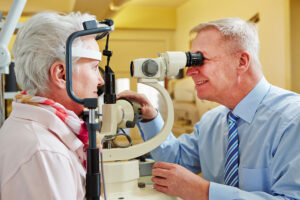Helping Seniors with Dry Eyes: What Causes It and What to Do About It
Dry eye syndrome is a common disease, especially among older people, that can cause pain and make it harder to see. Several things about getting older make this situation more likely to happen, but understanding the issue and gaining support from loved ones and senior home care providers can help them work through and hopefully decrease it. Consider the following when faced with this issue.
Common Causes For Dry Eyes

Many things cause dry eyes, including some which might need medical attention. The key is to assess the situation fully to ensure seniors get the necessary care. Additionally, proper monitoring by the senior home care team can narrow what might be causing the issue and encourage seniors to follow any suggested treatment plan.
Some of the most common causes are listed below.
Fewer tears: As people get older, their tear glands may make fewer tears or tears of lower quality. This drop in tear production can make it hard for the eyes to stay moist.
Changes in hormones: Changes in hormones, especially in older women, can make it hard to cry. Dry eyes may be caused by less estrogen in the body.
Medication: Older people often take more than one medicine for different health problems. Some medicines, like antihistamines, decongestants, and blood pressure pills, can dry their eyes.
Medical conditions: Older people are more likely to have health problems like diabetes, rheumatoid arthritis, or thyroid problems, which can increase the risk of dry eye syndrome.
Environmental factors: Older people may spend more time indoors, where heating and cooling devices can dry the air. Long-term use of screens and digital gadgets can also make them blink less and make their eyes feel dry.
Senior Home Care Helps Seniors With Dry Eyes
Loved ones and the senior home care team should encourage older people to see an optometrist or ophthalmologist for eye tests regularly. If dry eye signs are found and treated early, they won’t worsen. A few changes can also be made to their living area, such as adding a humidifier that will add moisture to the air or working with them on blinking exercises and encouraging blinking when they use technology.
Over-the-counter or prescription eyedrops might also work, as well as reviewing medication with the medical team to see if alternatives might make the issue less severe. The senior home care team can also help seniors by providing a warm compress on their closed eyelids, which can help open up clogged glands.
In addition, choosing foods that are high in omega-3 fatty acids may lessen the symptoms of dry eyes. This diet is beneficial for many reasons and can be encouraged by the home care team by assisting with meal planning, prep, and cooking.
Dry eyes can be annoying, especially for older people, but there are ways to deal with and relieve its symptoms. The senior home care team can help seniors have better eye health and a better quality of life overall by understanding the root cause and implementing practical solutions.
Sources: https://www.mayoclinic.org/diseases-conditions/dry-eyes/symptoms-causes/syc-20371863
https://www.aoa.org/healthy-eyes/eye-and-vision-conditions/dry-eye?sso=y
https://www.ncbi.nlm.nih.gov/pmc/articles/PMC4150485/
If you or an aging loved one are considering Senior Home Care Services in the Belton MO area, please contact the caring staff at Elder Care of Kansas City, today. Proudly serving Jackson, Clay, Platte, and Cass Counties in Missouri as well as Johnson and Wyandotte Counties in Kansas for over 30 years. Call us at 816-333-3322.
- Smart Ways To Make Showering Safer For A Senior Parent - May 16, 2025
- What Types of Situations Lead to Personality Changes in Seniors? - May 6, 2025
- Helping Seniors Overcome Insomnia - April 21, 2025
